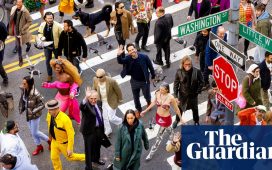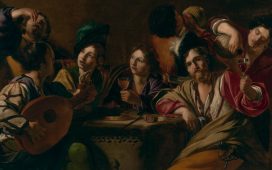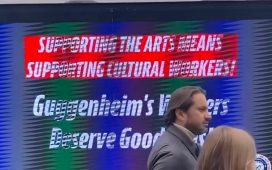Inaya Folarin Iman (inset right) has been appointed a trustee of the National Portrait Gallery, London
Inaya Folarin Iman, a presenter at the right-leaning UK television channel GB News, has been appointed by the government as a trustee at the National Portrait Gallery (NPG) in London for a four-year term. Earlier this year another GB News presenter, Mercy Muroki, joined the board of the Museum of the Home in east London.
GB News, a 24-hour channel which launched in June, gives an “unapologetically partisan, right-of-centre take on events”, said Adam Baxter, the director of standards at the regulator Ofcom. Bloomberg meanwhile called the channel the “British incarnation of Fox News”. Muroki presents a weekday programme on GB News called To the Point while Iman is the channel’s culture and social affairs editor.
Iman was appointed the NPG’s cultural and youth engagement trustee last week; according to the Cabinet Office advertisement for the post announced earlier this year, the successful candidate must have “a successful track record of delivering cultural projects and initiatives working with younger audiences” and demonstrate “an understanding of the diverse communities in the UK and a real commitment to promoting diversity and equality”.
Iman is a strong supporter of Brexit and stood as candidate for the Brexit party (Leeds North East) in the 2019 UK General Election; she told the i newspaper she was standing because “I deeply believe that our democracy is at stake and that so far, the main political parties have failed to do what it takes to protect and defend it.”
In an article published in the online political magazine Spiked last year, entitled 2020: the year racial identity took over, Iman described the Black Lives Matter movement as a “divisive form of racial identity politics”. She wrote: “The intensity of lockdowns, under which billions around the world were confined to their houses, provided the pressure-cooker conditions for BLM’s volcanic eruption on to the global stage. The case of George Floyd in the USA appears, in this sense, merely an opportunistic pretext for an outpouring of self-righteous rage.”
Iman is also director of The Equiano Project, a forum she founded last year to “promote the values of freedom, humanism and universalism in contrast to the climate of racial tribalism and identitarianism”, and a founding director of the Free Speech Union, an organisation described online as “a non-partisan, mass-membership public interest body that stands up for the speech rights of its members”. The online statement adds: “If you find yourself being targeted by a digital outrage mob on social media for having exercised your legal right to free speech, we may mobilise an army of supporters.”
The appointment of trustees has become a major issue in the so-called culture war engulfing the UK arts sector. Earlier this year, ministers were accused of flushing out museum board members who hold dissenting views after the re-appointment of the Bangladeshi-British academic Aminul Hoque as trustee at Royal Museums Greenwich was vetoed by the government. Hoque was reportedly rejected because of his focus on “decolonisation”.
The science author and historian Sarah Dry also withdrew as a trustee of the Science Museum Group in March after she was asked to support the government’s position on contested heritage. At the time of writing, Iman had not responded to a request for comment about whether she supports the government’s “retain and explain” policy towards controversial statues and monuments.
Muroki, a member of the government’s Commission on Race and Ethnic Disparities, was appointed trustee at the Museum of the Home in February. In June, protests erupted at the institution over the sculpture depicting the slave ship owner Robert Geffrye which stands at the front of the building.
“It is possible that ‘retain and explain’ might entail the relocation of an object,” Muroki told the Financial Times in June. “But what I’m worried about is this mob rule. I don’t want roads renamed or statues brought down because they offend a small number of people. I’m naturally a ‘small c’ conservative and believe it is best to take things gradually and bring people along.”
The Turner Prize-winning artist Lubaina Himid meanwhile told the Guardian that museum boards should remain autonomous. “I’ve sat on boards and from where I’m standing they are not hotbeds of radical thinking. They are respectable and respected and they should be allowed to think for themselves,” she said. Himid unveiled yesterday her commission for the UK’s government art collection.









